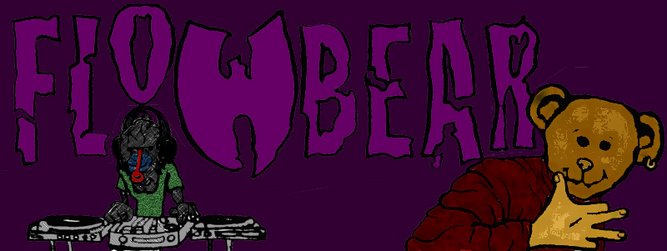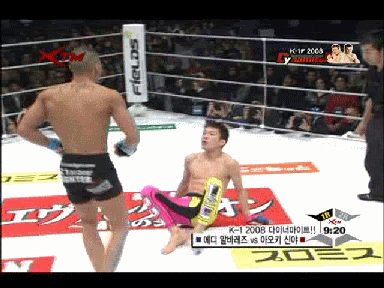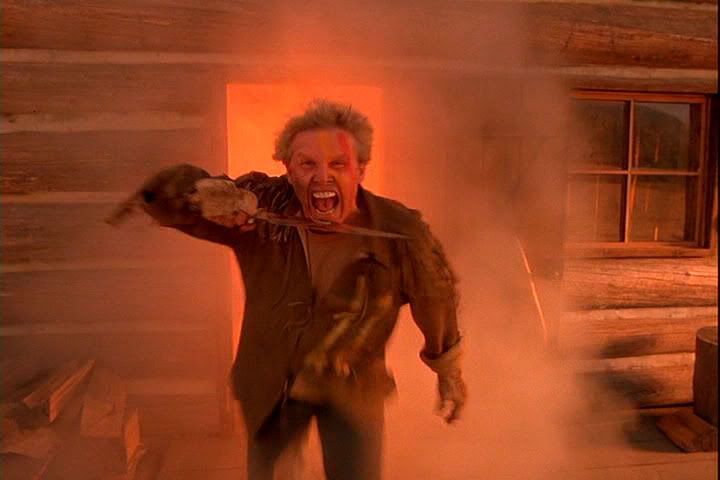I, Power-Bottom
I have a theory that the closest a heterosexual male can come to learning what another heterosexual male is like in bed is by grappling with him. But this doesn't go for just any two guys who have never grappled before. As with sex, the first few times basically consist of flailing, barely-concealed terror, unrealistic expectations, and crushing ineptitude. But once you know where to put your hands, and once you know how to shift your hips, and once you know the appropriate responses acts of aggression, you establish a baseline comfort level and start to develop a legitimate personality -- a set of skills and tactics that actually constitutes a kind of identity. It's hard to imagine, for instance, what it would be like to have sex entirely differently from how you have sex now, but once you have sex with your second partner it's surprising how different -- for all the consistencies -- each person is.
Grappling is the same way. Everyone has a certain style. Everyone learns the basic moves, but they work differently for everybody's body. And entirely different idioms, virtually different languages, develop out of roughly the same syntax. This is, in a sense, true of all sports, but grappling is more intimate than just about any other athletic endeavor. It's competition based on the unmediated communication of two bodies in contact. For instance: I know, by feeling where your limbs and your core are, and where your body is going, where I need to go to beat you to the spot. I know, by listening to your breathing, whether you're tired, and how hard you can push. I know when you moan you're about to give up, and I know when you grunt you're about to fight back. I know, by feeling your sweat all over me, that you are fucking disgusting and I'm going to get a staph infection.
As you can see, it's very much like sex. And everyone has a different specialty. There are guys who are wizards from side-control.
There are guys with suffocating back-mounts.
There are well-rounded guys with skills in all areas, but who don't dazzle you anywhere. There are guys with gaping holes in their games, weak spots, so you know if you wiggle a specific block they'll topple, Jenga-style. Then there are virtuosos, the kind of people who make every person you've ever met who says they're "good in bed" because they've gotten over their fear of leaving the light on look like a fraud. Watching my instructor grapple is like that scene in Watchmen where four Dr. Manhattans are having sex with Laurie while simultaneously making scientific breakthroughs in the other room. Basically the difference between him and me as grapplers is the same as the difference between me and Gandalf as wizards.
There are also pressure top-control guys, and I hate grappling with them.
They get on top of you and just wrench and twist you, manhandle you, out-strength and out-muscle you until they get you where they want you. They make mince-meat of you.
Of course, pressure top-control is the classic way to grapple. It's the way it's supposed to work, and the way it works at its highest level. It's why amateur wrestling is the best foundation for combat sports. The philosophy is simple: You power a guy onto the ground -- you get into a dominant position -- you neutralize his defense -- you attack until he submits. In amateur wrestling, the fight is over when you pin a guy's shoulders to the mat. The objective is simply to be on top, and for your opponent to have no way out. It's just all kinda... rapey-y... isn't it?
Amateur wrestling is generally done by the kind of people who wrestled at your high school, and those people are generally bad people.
I, on the other hand, am a guard player -- or what some affectionately (?) refer to as a "power-bottom." I like to fight off my back. This also means I start every fight in the least threatening position imaginable: the butt-scoot.
(We could go into all the ways this parallels my courtship strategy, but I believe it's important to leave certain things unsaid, for mystery's sake.)
There are a couple reasons for this. First, it's the best way to exploit my Gumby-ish flexibility by gift-wrapping people with my armlike legs into awkward positions with stupid names like "crackhead control."
More importantly, it allows me to attack and control from a situation that is typically submissive. It's a subversive way to fight -- by doing it, I re-appropriate a subaltern position and extract a new kind of power that counters the hegemony of the bourgeois status-quo of what fighting is "supposed" to be. It enacts a leveling deterritorialization that explodes constrictive stratifications, provides a line of flight to escape from the fascist regime of vertical, top-down power into the horizontal bleed of The Real.
I'm totally kidding. But hey, look, you can do Deleuzian literary criticism on literally anything, and that's something, right?
I herniated the left side of the C6/C7 disc in my neck -- again -- about a month and a half ago during BJJ class. This is apparently one of the worst discs to injure, because the nerve it protects is responsible for the left side of your body. Such as your heart. And your arm.
The first thing that happens when there's direct pressure on this cervical nerve is that your tricep shuts off. Poof. Gone. Nothing. It can't flex, and it almost instantly starts to atrophy. It turns out that this is the worst possible coping strategy your body could adopt, because when your tricep shuts off, all the other muscles in your arm and shoulder clench up into a vicelike Rube Goldberg contraption of overcompensation. The main problem here is that these other muscles are the muscles that pulled the disc out of alignment in the first place, and the only way to get it back where it needs to be is by engaging the tricep. But your central nervous system is telling your body that flexing this particular muscle is impossible, and your central nervous system is one hell of a bureaucrat. What it says, goes.
I hurt myself doing duck-unders, a wrestling move that somebody with a bad neck has no business practicing with a fiery ex-wrestler who really, passionately wants me to do it right for some reason. My head hit his arm, my neck folded back, and I felt a tingle in my shoulder that trickled, Reaganomically, down my arm.
At first, I thought I'd just pulled a muscle, and in retrospect I regret the fact that I shook it off and kept wrestling with people much bigger and stronger than I am for the next hour and a half; though, when I got to my car and the adrenaline wore off and I felt the characteristic numb tingling in my fingertips, I felt like a fucking savage for having toughed it out for so long. I felt considerably less tough after the half-hour drive home. I pulled up to my apartment building feeling like an army of radioactive wasps had gone to war with my shoulder, and I'm not sure I would have been able to finish out the drive if I hadn't kept myself occupied by screaming non-sequiturs at the top of my lungs at people on the sidewalk. Which is hilarious, by the way.
One of the most unsettling, and most characteristic, side effects of this particular herniated disc is "referred pain." All the signals from the nerves in your arm are routed through the central master-nerves in your spinal column on their way to your brain, but when your spinal column is compromised it interprets the pain as coming from everywhere other than where it's actually coming from. You're not supposed to feel anything in your spine -- that's why it's wrapped in armor. Essentially this is the same thing that happens to amputees when they get phantom limb -- acute sensations that actually exist nowhere below your neck, and yet are absolutely real -- except, mercifully, the limb is still there.
So that's the upside -- your arm isn't gone. The downside is that herniating this disc is, so they tell me, one of the most painful mundane injuries that can happen to a body, up there with kidney stones and childbirth. It has unfortunate social consequences, too, because it's difficult to explain -- to your friends why you're in such a terrible mood, to your doctor what hurts when what hurts is just past your fingers and somewhere to the left of your elbow, to your bosses why you can't get out of bed for a week straight.
I hurt my neck on a Saturday and didn't get out of bed until Monday. I didn't go to the doctor, because my health insurance makes it much cheaper to go to student health before I go to any independent providers. So I sucked on Aleve like Now 'N' Laters for forty-eight hours, moved as little as possible, tried to sleep, and tried not to breath.
I called Student Health services and made an appointment for 1:30 that afternoon, but the receptionist transferred me to the head nurse told me to go directly to the ER because "there's not a lot we can do for you here." I told her I would, hung up the phone, and started sobbing uncontrollably. I'm not a crier -- I once went plus-or-minus ten years without crying, and mostly all I can muster is a couple of dry-eyed convulsions and a choke or two. But not on this day. I'd all but forgotten what it feels like for tears to trail down your face and leave that wet feeling, and then dry into the same trail but sticky this time.
So I called my friend Nick, trying to pretend for some reason that everything was cool, asking him how he was, crying hard but fighting through it, and asked him to drive me to the emergency room. He finished his bowl of cereal and pulled up outside fifteen minutes later, and dropped me off in front of the emergency room entrance. I thanked him and hobbled away, clutching my elbow in a makeshift sling.
That was the last social contact I had for fifteen days.
I got to the ER at around noon. I paced. I avoided eye-contact. I resented the people in line ahead of me, and I resented the nurses who didn't seem to feel sorry for me. Forty-five minutes later, a doctor who spoke at least passable English called me into an examination room and asked me some questions -- I take Adderall, Sertraline, and Xanax sometimes; I'm not allergic to any medications; I have health insurance; my pain is a nine out of a possible ten. He looked at me skeptically and shuffled me off into another waiting room, where I got to hang out with three cool, friendly guys passed out in their chairs and two loving mothers ignoring their children. The moms turned on the TV in the corner that said "DO NOT CHANGE CHANNEL" and changed the channel to a soap opera. They talked to each other with incredible fluency about the characters on the show. One of the little girls cried. The other one played at the little toy-station in the corner. When her mother saw what she was doing -- a half hour later -- she called her away, forbade her to play on something so dirty, and scraped her hands, hard, with a baby wipe. This little girl started crying, too. The women talked louder about the soap opera.
I was called back into the examination room by the pretty nurse, by this point almost delirious with pain from sitting and standing -- two things, if you don't mind me saying, we as humans generally take for granted. In my brain, I told myself I would say, "You're one of them pretty nurses, like I done seen on the TV!" My brain told me this was a really very good idea, but when I opened my mouth my shoulder flared and all that came out was a sad little squeak that sounded like "gak!"
A teenage boy with his dad were led into the next room. I listened to the same pretty nurse interview him. "I had surgery for some abscesses and the stitches are torn and the cotton packing is coming out."
"And where are the abscesses?"
"Uhm, well, one's on my inner thigh, one's on my lower buttock, and one's on my... I guess... my taint area?"
"Your what?"
"My taint area?"
"Oh... OH."
"And every time I take the antibiotics I throw up."
I wondered what was wrong with this poor kid, and what it was like for his dad to be there. I wondered if they were scared. I was scared.
After an hour or so, a dignified greybeard of a doctor, earth-tone business-casual head to toe, swept into the room and asked what he could do for me. By this point it was about 3 pm. I'd had an appointment, you'll remember, with student health at 1:30, but they were not qualified to serve my needs. Well, it took all of three minutes for this doctor to confirm my self-diagnosis and write me scrips for Percocet and Prednisone. And then they turned me out the door. Three hours and three minutes for synthetic opioids and oral steroids seems like a small price to pay.
But I still haven't got the ER bill.

.jpg)





No comments:
Post a Comment